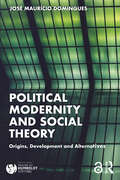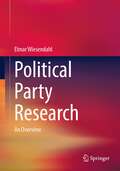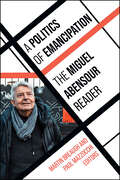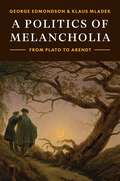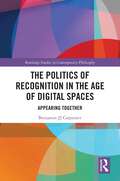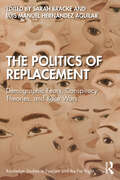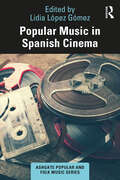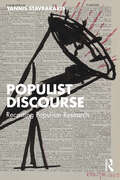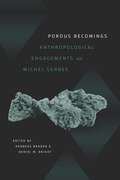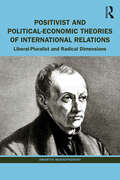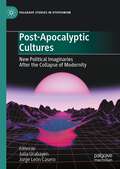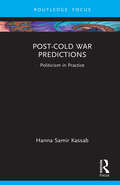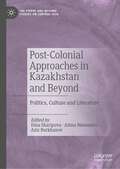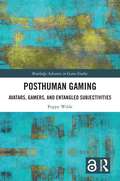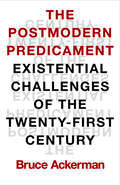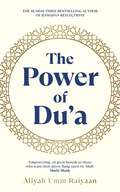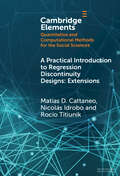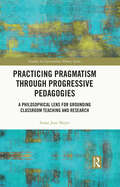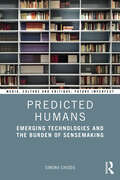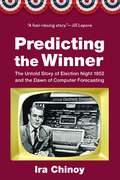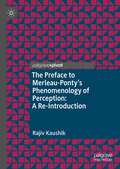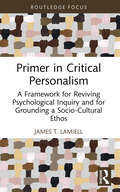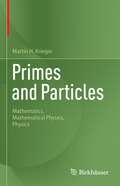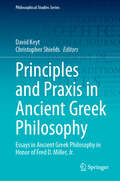- Table View
- List View
Political Modernity and Social Theory: Origins, Development and Alternatives
by Jose Maur¡cio DominguesModern liberal democracy and authoritarian collectivism have known diverse political regimes; autocratic, oligarchic or democratic, they each consist of a mixed, partly oligarchic regime in which plebeian politics are subordinated. With authoritarian collectivism’s defeat, a return to modernity has produced one more hybrid configuration.An in-depth investigation of political modernity and how it is differentiated from other forms of society, this book researches its origins and trajectory as a specific dimension of modern civilisation – articulating a renewed critical theory through an analysis of rights and law, politics, state and autonomy, social reproduction, crisis and political change.Examining these diverse aspects, Political Modernity and Social Theory proposes an encompassing and far-reaching approach spanning past and present – stressing radical plebeian democracy and maintaining a strong opening to the future and to possible alternatives to modernity.The Open Access version of this book, available at www.taylorfrancis.com, has been made available under a Creative Commons Attribution (CC-BY) 4.0 license.
Political Party Research: An Overview
by Elmar WiesendahlThe book by the well-known German party researcher Elmar Wiesendahl presents the development, theoretical perspectives, research approaches, and fields of investigation in party research in light of the state of the art.
A Politics of Emancipation: The Miguel Abensour Reader (SUNY series in Contemporary French Thought)
by Miguel AbensourDespite his influence in utopian studies and democratic theory, French philosopher Miguel Abensour (1939–2017) has yet to be fully discovered in the English-speaking world as only a fraction of his work has been translated. A Politics of Emancipation fills this void by translating a selection of his seminal essays into English for the first time. The Reader provides a systematic overview of Abensour's work and the two inseparable projects that govern his approach to political theory: on the one hand, a radical critique of all forms of domination and, on the other, a desire to conceptualize the political as the realm of freedom and emancipation. For Abensour, both projects are to be undertaken together in order to avoid the double trap of an evacuation of conflict from politics and the reduction of politics to a form of domination. In other words, a politics of emancipation requires a "ruthless" critique of domination coupled with an analysis of politics as the domain within which human beings experience freedom and equality.
A Politics of Melancholia: From Plato to Arendt
by George Edmondson Klaus MladekWhy melancholia is a vital form of social critique and a catalyst for political renewalMelancholia is wrongly condemned as a condition of withdrawal and despair that alienates its sufferer from community. Countering that misconception, A Politics of Melancholia reclaims an understanding of melancholia not as an affliction in need of a remedy but as an affirmative stance toward decay and ruination in political life, and restores the melancholic figure—by turns inventive and destructive, outraged and inspired—to their rightful place as the poet of political thought.George Edmondson and Klaus Mladek identify pivotal moments of political melancholia in ancient and modern texts, offering new perspectives on the death of Socrates in Plato&’s dialogues, the fratricide in Hamlet, Woyzeck&’s killing of Marie in Georg Büchner&’s Woyzeck, the murder of Moses in Freud&’s thought, and the betrayal of the revolutionary idea that Hannah Arendt identifies in her critique of eighteenth-century revolutions. Melancholia emerges here as a disposition that is mournful but also jubilant, a mood of unbending disconsolation that remains faithful to a scene of downfall, to events that cannot be forgotten, and to things that cannot be governed.Recovering a tradition of thought that is both affirmative and hopeful, this eloquent book reveals how political melancholia embodies a shared condition of discontent that binds communities together and inspires change.
The Politics of Recognition in the Age of Digital Spaces: Appearing Together (Routledge Studies in Contemporary Philosophy)
by Benjamin JJ CarpenterThis book provides a philosophical analysis of the notion of selfhood that underlies identity politics. It offers a unique theory of the self that combines previous scholarly work on recognition and the phenomenology of space. The politics of identity occupy the centre of a contested terrain. Marginalised and oppressed peoples continue to seek the transformation of our shared social world and our political institutions required for their lives to be liveable. Public criticism and academic treatments of identity politics often take a disparaging view that treats it as subordinate to more general political questions about justice and the organisation of society and its institutions. This book argues that these polemics ignore the numerous ways in which all politics is concerned with matters of selfhood and identity. Through a rereading of Hegel’s account of recognition as an ongoing and dynamic process that constitutes the self, it presents selves—and the categories of identity that qualify these selves—as fundamentally conditioned by the environments in which they appear before themselves and others. It also argues that we do the work of identity in public spaces—particularly digital spaces—and that these spaces shape what identities we can assume and what those identities mean. Contemporary social media technologies facilitate the production of particular forms of selfhood through the combined logics of the interface, the profile, and the post. The Politics of Recognition in the Age of Digital Spaces will be of interest to scholars and advanced students working in a wide range of disciplines including political philosophy, phenomenology, philosophy of technology, sociology, political theory, and critical theory. It will also appeal to anyone with an interest in contemporary identity politics, whether as a matter of study or lived experience.
The Politics of Replacement: Demographic Fears, Conspiracy Theories, and Race Wars (Routledge Studies in Fascism and the Far Right)
by Sarah Bracke Luis Manuel Hernández AguilarThe Politics of Replacement explores current demographic conspiracy theories and their entanglement with different forms of racism and exclusionary politics such as sexism. The book focuses on population replacement conspiracy theories, i.e. those imaginaries and discourses centered on the idea that the national population is under threat of being overtaken or even wiped out by those considered as “alien” to the nation, and that this is the result of concerted efforts by “elites”. Replacement conspiracy theories are on the rise again: from Eurabia fantasies to Renaud Camus’ The Great Replacement, white supremacist discourses are thriving and increasingly broadcasting in mainstream venues. To account for their rise and spread, this edited volume brings together research on various dimensions of population replacement conspiracy theories: different theoretical and methodological approaches, different social scientific and humanities (inter)disciplinary backgrounds, different geographical case-studies (across Europe, North America, Southeast Asia, and Oceania), different time-periods (medieval archives, colonial archives, Nazi archives, post-colonial migrations, post-9/11), and different forms of racialization and racisms (Islamophobia, antisemitism, racism against migrants and refugees), as well as with the entanglement of population replacement discourse with gendered violence. The book is organized into four sections: (1) exploring the historical background of the current rise of demographic conspiracy theories; (2) tracing the (neoliberal) governmentalities in and through which replacement discourse operates; (3) analysing the particularly intense focus on the threat of Muslims in contemporary replacement conspiracy theories, and (4) investigating the connection between replacement conspiracies, gender, and violence. This title is essential reading for scholars, journalists, and activists interested in the contemporary far right, conspiracy theories, and racisms.
Popular Music in Spanish Cinema (Ashgate Popular and Folk Music Series)
by Lidia López GómezPopular Music in Spanish Cinema analyses the aesthetics and stylistic development of soundtracks from national productions, considering how political instability and cultural diversity in Spain determined the ways of making art and managing culture. As a pioneering study in this field, the chronologically structured approach of this book provides readers with a complete overview of Spanish music and connects it to the complex historical events that conditioned Spanish culture throughout the 20th century to the present day, from the Second Republic, the Spanish Civil war, and the dictatorship through to democracy. The book enables an understanding of the relationships between the recording and film production industries, the construction of collective imagination, the formulation of new stereotypes, semiotic meanings within film music and the musical exchanges between national and international cinema. This volume is an essential read for students and academics in the field of musicology, ethnomusicology and history as well as those interested in the study of diverse musical styles such as copla, zarzuela, flamenco, jazz, foxtrot, pop and rock and how they have been used in Spanish films throughout history.
Populist Discourse: Recasting Populism Research
by Yannis StavrakakisPopulist Discourse: Recasting Populism Research offers a refreshingly innovative discourse theory perspective on populist phenomena. Reading this book will help you familiarize yourself with the historical genealogy of significant populist phenomena from the end of the 19th century onwards and with the main conceptual/theoretical accounts established to analyse them. Mainstream conceptualizations of populism in both academia and public discourse are critically discussed in order to map new, promising avenues for research. Inspired by the works of Ernesto Laclau and Chantal Mouffe, the book addresses current challenges within populism research and highlights the new directions that a conceptually nuanced, theoretically rigorous and historically informed discursive orientation can contribute to the contemporary study of populism. Without sacrificing attention to detail, strong bibliographical support and a focus on the future development of populism research, Populist Discourse is written in accessible language to engage populism scholars, advanced undergraduates and graduate-level students within the field of political science. Due to its interdisciplinary character, it will also appeal to readers associated with various politically informed area studies and the broader field of ideology and discourse analysis.
Porous Becomings: Anthropological Engagements with Michel Serres
by Andreas Bandak and Daniel M. KnightOne of the foremost intellectuals of his generation, French philosopher of science Michel Serres (1930–2019) broke free from disciplinary dogmas. His reflections on science, culture, technology, art, and religion have proved foundational to scholars across the humanities. The contributors to Porous Becomings bring the inspirational and enigmatic world of Serres to the attention of anthropology. Through ethnographic encounters as diverse as angels and religious conversion in Ethiopia, the percolation of war in Bosnia, and incarcerated bodies crossing the Atlantic, the contributors showcase how Serres’s interrogation of the fundamentals of human existence opens new pathways for anthropological knowledge. Proposing the notion of "porosity" to characterize permeability across boundaries of time, space, literary genre, and academic discipline, they draw on Serres to map the constellations that connect humans, time, technology, and planet Earth. The volume concludes with a conversation between the editors and Vibrant Matter author Jane Bennett.Contributors. Andreas Bandak, Jane Bennett, Tom Boylston, Steven D. Brown, Matei Candea, Alberto Corsín Jiménez, David Henig, Michael Jackson, Daniel M. Knight, Celia Lowe, Morten Nielsen, Stavroula Pipyrou, Elizabeth Povinelli, Andrew Shryock, Arpad Szakolczai
Positivist and Political-Economic Theories of International Relations: Liberal-Pluralist and Radical Dimensions
by Amartya MukhopadhyayThis book provides an introduction to positivist-pluralist theories of international relations (IR) which emerged during the early-and mid-1950’s along with Marxist political economic and non-Marxist economic theories of IR. Positivist and Political-Economic Theories of International Relations is an in-depth critical study of texts and literature which highlight IR’s methodological pluralism even after it gained maturity. It examines how pluralist political status quo and radical economic criticism coexist in discrete areas of the discipline. Insights are provided into key positivist liberal-pluralist theories, namely decision-making approaches, and theories of integration, regionalism, interdependence, and regime. It discusses the four political economic and critical theories of Marxism, dependency, world systems, and international political economy. The book, as an advanced supplementary reader, will be of great interest to researchers and students of international relations, history, law, and the multidisciplinary social scientific field of political economy.
Post-Apocalyptic Cultures: New Political Imaginaries After the Collapse of Modernity (Palgrave Studies in Utopianism)
by Julia Urabayen Jorge León CaseroThis book advocates for the necessity of recovering the value of utopias as political projects that open new channels of action. The criticism of modern political utopias is based on the supposed impossibility of creating for the future because there is no longer a future (apocalyptic ideology). However, this edited collection seeks to show that the post-apocalyptic world in which we live entails a renewed freedom of design for the radical reorganization of institutions. Post-apocalyptic cultures are not obligated to follow the capitalist, anthropocentric, correlationist and sovereign modes of the old political project of emancipation—the Western enlightenment—that has started to collapse. With this in mind, this book is divided into four sections dedicated to the main themes from which to rethink the projects of political emancipation that are possible nowadays: technopolitics; posthumanist biopolitics; non-western politicsl and the crossover between arts and politics.
Post-Cold War Predictions: Politicism in Practice (ISSN)
by Hanna Samir KassabPost- Cold War Predictions examines how the international order evolved after the collapse of the Soviet Union (and before the attacks on 9/11) by focusing on the ways we study and understand major powers’ security behavior within the evolving multipolar order. Beginning with an overview of Post-Cold War literature, Kassab summarizes and evaluates influential Post-Cold War texts to better understand scholarship’s need to predict. First, he discusses the central importance of power in international relations and drives home the central focus of international structures, linking findings to the broader structure-agent problem. He then reinterprets the purpose of theory, preferring explanatory theories to those that aim to predict outcomes. To understand the context by which political ideas were developed and followed as if they were political ideologies, Hanna Samir Kassab makes explicit the links between historicism and historiography, forwarding a new methodology for studying political science: Politicist analysis. Using simple jargon and defining terms where necessary, this succinct and enlightening text is required reading for all those interested in international politics.
Post-Colonial Approaches in Kazakhstan and Beyond: Politics, Culture and Literature (The Steppe and Beyond: Studies on Central Asia)
by Dina Sharipova Alima Bissenova Aziz BurkhanovThis book explores the postcolonial discourse and decolonization processes in modern Kazakhstan and beyond. It pays particular attention to such areas as national and religious identity, language, literature, and historical narratives. Despite the fact that the post-colonial theory initially emerged in other regions of the world, it has increasingly been applied in the scholarship on Central Asia. Exploring recent debates on post-coloniality in Kazakhstan, this book is an attempt to bring together two bodies of scholarly literature: scholarship on culture and society in post-Soviet Central Asia and research on post-colonial theory. This volume will be of interest to scholars of Eurasian studies as well as researchers and students of post-colonialism in various contexts beyond Eurasia.
Posthuman Gaming: Avatars, Gamers, and Entangled Subjectivities (Routledge Advances in Game Studies)
by Poppy WildePosthuman Gaming: Avatars, Gamers, and Entangled Subjectivities explores the relationship between avatar and gamer in the massively multiplayer online roleplaying game World of Warcraft, to examine notions of entangled subjectivity, affects and embodiments – what it means and how it feels to be posthuman. With a focus on posthuman subjectivity, Wilde considers how we can begin to articulate ourselves when the boundary between self and other is unclear. Drawing on fieldnotes of her own gameplay experiences, the author analyses how subjectivity is formed in ways that defy a single individual notion of "self", and explores how different practices, feelings, and societal understandings can disrupt strict binaries and emphasise our posthumanism. She interrogates if one can speak of an "I" in the face of posthuman multiplicity, before exploring different analytical themes, beginning with how acting theories might be posthumanised and articulate the relationship between avatar and gamer. She then defines posthuman empathy and explains how this is experienced in gaming, before addressing the need to account for boredom, the complexity of nostalgia, and ways death and loss are experienced through gaming. This volume will appeal to a broad audience and is particularly relevant to scholars and students of cultural studies, media studies, humanities, and game studies. Chapters 2 and 7 of this book are freely available as a downloadable Open Access PDF at http://www.taylorfrancis.com under a Creative Commons Attribution-Non Commercial-No Derivatives (CC-BY-NC-ND) 4.0 license.
The Postmodern Predicament: Existential Challenges of the Twenty-First Century
by Bruce AckermanOne of our most influential political theorists offers a boundary-breaking—and liberating—perspective on the meaning of life in the internet age Human beings have taken one thing for granted since our earliest days: we are bodily creatures dealing with one another on a face-to-face basis. The internet has shattered this fundamental feature of human existence. We are suddenly living our lives in two worlds at once—shifting endlessly from virtual to physical reality as we reach out to others. Worse yet, we are developing different personal identities in our two worlds. We say and do things in virtual reality that flatly contradict our face-to-face commitments to family, friends, and fellow-workers—and vice versa. The Postmodern Predicament explores these dilemmas at each phase of the life cycle, beginning at the moment a young child picks up a cell phone. The existentialist tradition of the twentieth century provides a precious perspective on our postmodern dilemmas. Thinkers and doers like Simone de Beauvoir and Jean-Paul Sartre considered the fragmentation of modern life as a central source of contemporary anxieties. Like them, Ackerman views the challenges of the internet age as a political, no less than personal, problem—and proposes concrete reforms that that could mobilize broad-based support for democracy against demagogic assaults on its very foundations.
The Power of Du'a
by Aliyah Umm Raiyaan'Empowering....of great benefit to those who want their doors flung open by Allah' - Mufti MenkWhat seems impossible can become possible through du’aIn The Power of Du’a, Sunday Times bestselling author and revert, Aliyah Umm Raiyaan takes you on a journey that shows how faith and practising du’a (a personal supplication) can transform your life.Featuring inspirational real-life stories from those who have experienced miraculous results from living with du’a, this book is a comforting guide to revive and develop a close relationship with Al Mujeeb – The One Who Responds. Through life’s challenges and struggles, with tools from the Qur’an and Sunnah, you will learn how to:Sincerely prepare your heart before du’aAsk of Allah from a place of certainty, during du’aMove forward in faithful trust after He respondsYou will learn how to prepare your heart and then ask of Allah from a place of sincerity and certainty. This book provides tools to navigate the response to your du’a, developing a close and trusting relationship with The Most High.Deeply moving and uplifting, The Power of Du’a is for anyone looking to reflect, reshape their dialogue with the Divine and walk in complete faith – embracing the perfect plans Allah has for each and every one of us.
The Power to Destroy: How the Antitax Movement Hijacked America
by Michael J. GraetzHow the antitax fringe went mainstream—and now threatens America&’s futureThe postwar United States enjoyed large, widely distributed economic rewards—and most Americans accepted that taxes were a reasonable price to pay for living in a society of shared prosperity. Then in 1978 California enacted Proposition 13, a property tax cap that Ronald Reagan hailed as a &“second American Revolution,&” setting off an antitax, antigovernment wave that has transformed American politics and economic policy. In The Power to Destroy, Michael Graetz tells the story of the antitax movement and how it holds America hostage—undermining the nation&’s ability to meet basic needs and fix critical problems.In 1819, Chief Justice John Marshall declared that the power to tax entails &“the power to destroy.&” But The Power to Destroy argues that tax opponents now wield this destructive power. Attacking the IRS, protecting tax loopholes, and pushing tax cuts from Reagan to Donald Trump, the antitax movement is threatening the nation&’s social safety net, increasing inequality, ballooning the national debt, and sapping America&’s financial strength. The book chronicles how the movement originated as a fringe enterprise promoted by zealous outsiders using false economic claims and thinly veiled racist rhetoric, and how—abetted by conservative media and Grover Norquist&’s &“taxpayer protection pledge"—it evolved into a mainstream political force.The important story of how the antitax movement came to dominate and distort politics, and how it impedes rational budgeting, equality, and opportunities, The Power to Destroy is essential reading for understanding American life today.
A Practical Introduction to Regression Discontinuity Designs: Extensions (Elements in Quantitative and Computational Methods for the Social Sciences)
by null Matias D. Cattaneo null Nicolas Idrobo null Rocío TitiunikIn this Element, which continues our discussion in Foundations, the authors provide an accessible and practical guide for the analysis and interpretation of Regression Discontinuity (RD) designs that encourages the use of a common set of practices and facilitates the accumulation of RD-based empirical evidence. The focus is on extensions to the canonical sharp RD setup that we discussed in Foundations. The discussion covers (i) the local randomization framework for RD analysis, (ii) the fuzzy RD design where compliance with treatment is imperfect, (iii) RD designs with discrete scores, and (iv) and multi-dimensional RD designs.
Practicing Pragmatism through Progressive Pedagogies: A Philosophical Lens for Grounding Classroom Teaching and Research (Studies in Curriculum Theory Series)
by Susan Jean MayerThis book contributes to the contemporary revival of pragmatism as a practical and ultimately, as Mayer argues, necessary philosophical stance within democratic schools. Given that pragmatism addresses the question of how people can move forward in the absence of transcendent Truth, the author shows how pragmatism also—and not incidentally—provides grounds for pluralistic democratic societies to move forward in the absence of shared belief systems. Weaving together philosophical analysis and classroom discourse research, Mayer explores the relationships among pragmatism, progressive educational theory, and democratic knowledge construction processes and their implications for enacting progressive educational practices in schools. Several original, research-based heuristics that can serve in reliably identifying, studying, and orchestrating distinctively democratic knowledge construction processes are presented. The importance of granting all students a share of interpretive authority is also emphasized. For in learning to observe and reflect on one’s own terms, attend closely to the observations and interpretations of one’s peers, and reason collaboratively in a transparent and principled manner, young people are enculturated into essential democratic values, commitments, and practices. This book is written for a general audience and is intended for all those concerned with strengthening the democratic character of schools and societies. It is likely to appeal to scholars, researchers, and practitioners with interests in philosophy and classroom discourse and curriculum studies, as well as philosophers of education and the social sciences more broadly.
Predicted Humans: Emerging Technologies and the Burden of Sensemaking (Media, Culture and Critique: Future Imperfect)
by Simona ChiodoPredicting our future as individuals is central to the role of much emerging technology, from hiring algorithms that predict our professional success (or failure) to biomarkers that predict how long (or short) our healthy (or unhealthy) life will be. Yet, much in Western culture, from scripture to mythology to philosophy, suggests that knowing one’s future may not be in the subject’s best interests and might even lead to disaster. If predicting our future as individuals can be harmful as well as beneficial, why are we so willing to engage in so much prediction, from cradle to grave?This book offers a philosophical answer, reflecting on seminal texts in Western culture to argue that predicting our future renders much of our existence the automated effect of various causes, which, in turn, helps to alleviate the existential burden of autonomously making sense of our lives in a more competitive, demanding, accelerated society. An exploration of our tendency in a technological era to engineer and so rid ourselves of that which has hitherto been our primary reason for being – making life plans for a successful future, while faced with epistemological and ethical uncertainties – Predicted Humans will appeal to scholars of philosophy and social theory with interests in questions of moral responsibility and meaning in an increasingly technological world.
Predicting the Winner: The Untold Story of Election Night 1952 and the Dawn of Computer Forecasting
by Ira ChinoyThe history of American elections changed profoundly on the night of November 4, 1952. An outside-the-box approach to predicting winners from early returns with new tools—computers—was launched live and untested on the newest medium for news: television. Like exhibits in a freak show, computers were referred to as &“electronic brains&” and &“mechanical monsters.&” Yet this innovation would help fuel an obsession with numbers as a way of understanding and shaping politics. It would engender controversy down to our own time. And it would herald a future in which the public square would go digital. The gamble was fueled by a crisis of credibility stemming from faulty election-night forecasts four years earlier, in 1948, combined with a lackluster presentation of returns. What transpired in 1952 is a complex tale of responses to innovation, which Ira Chinoy makes understandable via a surprising history of election nights as venues for rolling out new technologies, refining methods of prediction, and providing opportunities for news organizations to shine. In Predicting the Winner Chinoy tells in detail for the first time the story of the 1952 election night—a night with continuing implications for the way forward from the dramatic events of 2020–21 and for future election nights in the United States.
The Preface to Merleau-Ponty's Phenomenology of Perception: A Re-Introduction
by Rajiv KaushikThis book offers a critical re-appraisal of what is perhaps Merleau-Ponty’s most widely read text, the Preface to his Phenomenology of Perception. Although open and enigmatic text, the Preface is still often used to introduce phenomenology in general and Merleau-Ponty’s work specifically to students, scholars in disciplines other than philosophy, and art practitioners. Taking advantage of the fact that many of his course notes have been posthumously published in the last few decades, this book situates the Preface to the Phenomenology of Perception in the context of Merleau-Ponty's later work and shows how it contains many of the threads on which Merleau-Ponty would later pull. In doing so, the book chapters elaborate key themes in the Preface: “Phenomenology and its Paradoxes,” “Phenomenology and its Method,” “Phenomenology and its Incompletion,” “Phenomenology and Non-Phenomenology." Readers will learn about the radicality of Merleau-Ponty’s early articulation of phenomenology, how much it already suggests the profound transformation of phenomenology usually associated with his more mature work.
Primer in Critical Personalism: A Framework for Reviving Psychological Inquiry and for Grounding a Socio-Cultural Ethos (ISSN)
by James T. LamiellThis insightful book offers contemporary psychologists and other social theorists an understanding of the comprehensive system of thought developed by the German scholar William Stern (1871–1938) known as critical personalism.Expanding the author’s ongoing efforts in this area, the book considers, firstly, how critical personalism could ground a needed revival of psychological science, a need created by the field's gradual transformation, through its widespread adoption of aggregate statistical methods of investigation, into a discipline better characterized as 'psycho-demography.' Consistent with Stern's own view of the potential of critical personalism vis-a-vis socio-ethical concerns, the book then explores how the framework could facilitate a transcendence of thinking about racial and other social relationships beyond currently prevailing narratives about personkinds into narratives that are actually about persons. This part of the book includes a chapter discussing Stern's own historical efforts in this direction, serving to highlight the non-individualistic nature of critically personalistic thinking. Throughout, Lamiell constructs a clear case for the merits and applicability of critical personalism in modern psychology and social thought.Primer in Critical Personalism will interest established psychological scientists and advanced students in the field, as well as those who are concerned about our contemporary socio-cultural ethos and the prospects for its improvement, including philosophers, sociologists, educators, journalists, clerics, and thoughtful laypersons alike.
Primes and Particles: Mathematics, Mathematical Physics, Physics
by Martin H. KriegerMany philosophers, physicists, and mathematicians have wondered about the remarkable relationship between mathematics with its abstract, pure, independent structures on one side, and the wilderness of natural phenomena on the other. Famously, Wigner found the "effectiveness" of mathematics in defining and supporting physical theories to be unreasonable, for how incredibly well it worked. Why, in fact, should these mathematical structures be so well-fitting, and even heuristic in the scientific exploration and discovery of nature? This book argues that the effectiveness of mathematics in physics is reasonable. The author builds on useful analogies of prime numbers and elementary particles, elementary structure kinship and the structure of systems of particles, spectra and symmetries, and for example, mathematical limits and physical situations. The two-dimensional Ising model of a permanent magnet and the proofs of the stability of everyday matter exemplify such effectiveness, and the power of rigorous mathematical physics. Newton is our original model, with Galileo earlier suggesting that mathematics is the language of Nature.
Principles and Praxis in Ancient Greek Philosophy: Essays in Ancient Greek Philosophy in Honor of Fred D. Miller, Jr. (Philosophical Studies Series #155)
by David Keyt Christopher ShieldsThis collection of original articles draws from a cross section of distinguished scholars of ancient Greek philosophy. It is focussed primarily on the philosophy of Aristotle but comprises as well studies of the philosophy of Socrates, Plato, and Epicurus. Its authors explore a range of complementary topics in value theory, moral psychology, metaphysics, natural philosophy, political theory, and methodology, highlighting the rich and lasting philosophical contributions of the thinkers investigated. Opening with an engaging intellectual autobiography of its honoree, Fred D. Miller, Jr., the volume offers treatments of Socrates as a citizen; Plato’s attitude towards poetry; Socratic self-knowledge; Plato’s conception of law in his Republic; explorations of reason, goodness, and moral conduct in Plato; Platonic metaphysics; Aristotelian causation; Aristotelian metaphysics and normativity; natural philosophy in Aristotle; Aristotelian logic; political theory and approaches to justice in Aristotle’s Politics; methodological reflections on how best to approach Aristotle’s indefensible ideas; and closes with a reconsideration of Epicurus on death and the art of dying. Altogether, the volume reflects the richness of the ongoing community of philosophical scholars dedicated to reconstructing, assessing, and criticizing the principal philosophers of the ancient world, whose epoch-forming explorations of the key elements of human life—considered socially, politically, psychologically, and metaphysically—remain topics of lively investigation today. It will be of interest to philosophers of many stripes, including those with a primary interest in ancient philosophy but extending as well to those with systematic interests in the themes it explores. This volume will be a valuable addition to all libraries serving communities dedicated to researching and studying the origins of Western philosophy.
